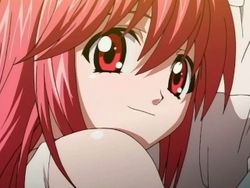 The bishōjo style of drawing uses large, limpid
eyes for increased cuteness, as in the character
of Nyū from
Elfen Lied.
The bishōjo style of drawing uses large, limpid
eyes for increased cuteness, as in the character
of Nyū from
Elfen Lied.
Bishōjo (美少女; びしょうじょ; literally, "beautiful young girl"), also spelled bishoujo, is a Japanese term used to refer to young and pretty girls, usually below college age.
Contents |
Bishōjo in manga and anime
Bishōjo are seen in almost all genres of anime and manga, ranging from shōjo to mecha, but especially renai games and so-called harem anime. It is sometimes considered the most mild form of fanservice, particularly if older women would be more appropriate characters. A "bishōjo series" is a series directed towards a male audience predominantly featuring such characters, and usually a single token male character, if any. The main draws for this audience are typically the art and the attractive female characters, and the term is sometimes itself perceived negatively as a "genre" solely depending on its marketability of cute characters.
It is distinguished from the similar sounding shōjo demographic by referring to the gender of the characters, not the intended audience. Shōjo is manga/anime for girls; bishōjo is manga/anime about pretty girls, usually targeted towards a male audience.
Moé style


A style called "moé style" is often used on (but not limited to) drawing bishoujo. It is very common in manga and anime. Moé style features are:
- Big eyes
- Big pupil and Iris
- Short body figure
- Slim limbs
- Small simple nose
- Flat face
- Slim body frame
Further more, the transparent feeling of pupils and the "stars" like reflection in eyes are often exaggrated, regardless of surrounding lighting.
Bishōjo contests
Singing star Aya Ueto first became famous through a televised national bishōjo beauty contest at the age of twelve. Model and actress Ryoko Yonekura also won one in 1992.
See also
- BL for bishōnen anime
- Josei, anime and manga intended for young adult women
- Seinen, anime and manga intended for young adult men
- Shōnen, anime and manga intended for teenage or younger boys
Categories: Anime and manga terminology




 216.73.216.133
216.73.216.133 User Stats:
User Stats:
 Today: 0
Today: 0 Yesterday: 0
Yesterday: 0 This Month: 0
This Month: 0 This Year: 0
This Year: 0 Total Users: 117
Total Users: 117 New Members:
New Members:
 216.73.xxx.xxx
216.73.xxx.xxx
 Server Time:
Server Time: